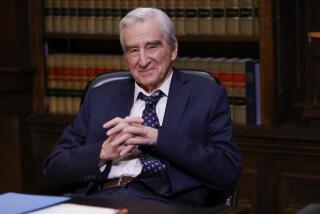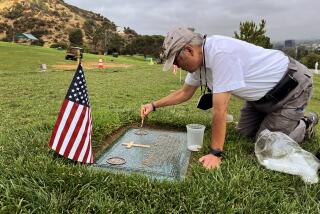Dick York; Co-Starred in TV Series ‘Bewitched’
- Share via
Dick York, the actor who created the role of Darrin Stephens, husband to Elizabeth Montgomery’s witchy wife Samantha on the television series “Bewitched,” has died. He was 63.
York, who spent his declining years redistributing surplus goods to the homeless through his Acting for Life program, died Thursday at Blodgett Memorial Medical Center in Grand Rapids, near his home in Rockford, Mich.
A former three-pack-a-day smoker, York had suffered for years with emphysema. He also battled a degenerative spine, first injured in 1958 while shooting the Gary Cooper film, “They Came to Cordura.” Several actors were lifting a railroad handcar and, when the director yelled “Cut!” York was the last to let go. The car fell on him, wrenching his spine and tearing his back muscles.
That injury prompted York’s addiction to muscle relaxants, codeine and sleeping pills, which eventually cost him his best-remembered role in “Bewitched.” The Emmy nominee originated the role of the hapless mortal husband and was with the show during its most popular years, 1964-69. After he collapsed on the set in 1969, he was replaced by Dick Sargent.
The series, featuring Montgomery as a witch who could work miracles by a twitch of her nose, and Agnes Moorhead as her overbearing witch mother, was the second-highest-rated series in its debut season, 1964-65, behind only “Bonanza.”
Born in South Bend, Ind., and reared in Depression-era Chicago, Richard Allen York claimed that he began acting as a child when he pretended he did not know his Christmas toys were secondhand. Prodded by a parochial school nun playing talent scout, York sang publicly as a soprano, and at 15 won the starring role on the NBC radio show “That Brewster Boy.”
At the studio he met a 12-year-old radio performer named Joan Alt. Years later, the girl he called Joey became his wife and the mother of his five children, Kim, Amanda, Stacie, Chris and Matthew, who survive him.
Moving on to Broadway, York played in “Tea and Sympathy” with Deborah Kerr in 1953 and in “Bus Stop” two years later.
York was signed to a contract by Columbia, and performed with such stars as Gene Kelly and Spencer Tracy in “Inherit the Wind” in 1960, among other films.
The lucrative role on “Bewitched” seemed a natural progression after the radio shows, theater and films. But it was the capstone of any meaningful career for York.
Eighteen months after he was replaced by Sargent, York decided to quit painkillers and other drugs cold turkey. He moved in temporarily with his mother in Buena Park so that his wife and children would not have to see the torment caused by his withdrawal.
The Yorks had invested in a Covina apartment house, but lost it to foreclosure. By 1976, they were on welfare. They survived for a decade on welfare and unemployment checks and bit roles York was able to get on television.
The couple moved to Rockford in 1986 to care for Mrs. York’s widowed mother. After her death in 1988, they stayed in her house, living on York’s $650-a-month Screen Actors’ Guild pension.
With his characteristic good humor, York discussed his Acting for Life program with the Los Angeles Times in 1989. He was tethered to an oxygen tank, slowly dying from his lung disease.
“I feel wonderful,” he said. “It’s just my body that’s dying.”
York began his efforts on behalf of the homeless by reading about the McKinney Act, an underused federal law that was supposed to set up government surplus giveaway programs. Using his familiar and still strong voice on the telephone, he badgered government workers to find out what was in storage, and then get it sent to shelters.
The effort pried loose 15,000 outfits from Army surplus, thousands of mattresses and blankets, thousands of pairs of pantyhose, and 5,000 cans of orange juice in 1988 alone.
“There is no program--drug addiction, homelessness--that I would not give whatever I can,” York told another interviewer. “I’m fortunate I still have my voice.
“I don’t know how I do it,” he said, discussing his one-man clearinghouse operation. “It just gets done.”
More to Read
The complete guide to home viewing
Get Screen Gab for everything about the TV shows and streaming movies everyone’s talking about.
You may occasionally receive promotional content from the Los Angeles Times.






